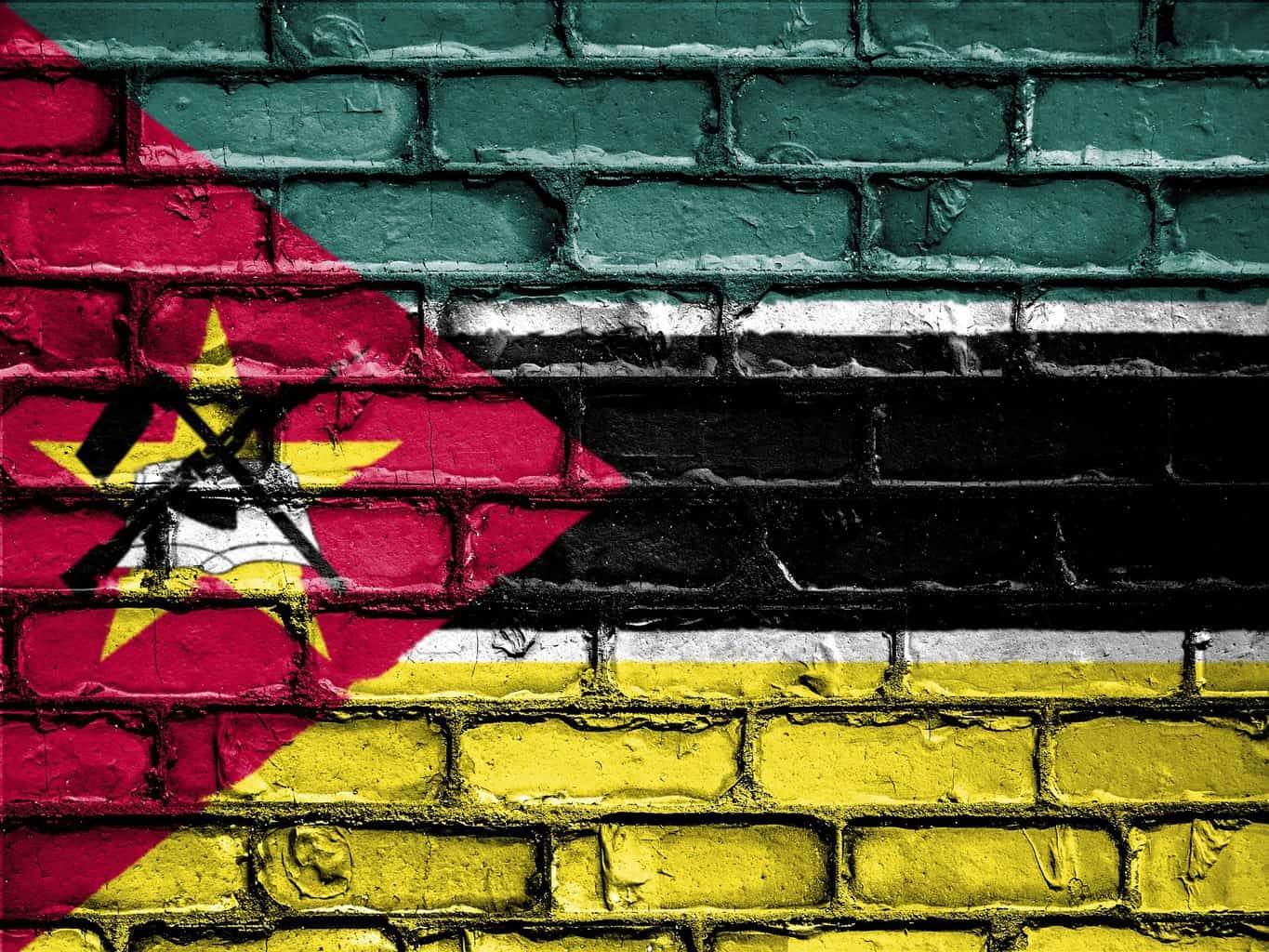Threats to free speech in Mozambique
This article has been updated to reflect the 2019 HRMI data.
Free speech is under attack in Mozambique, according to data from the Human Rights Measurement Initiative (HRMI), backing up reports from journalists inside and outside the country.
Key findings
- Mozambique received a score of 3.6 out of 10 for protection of freedom of opinion and expression in HRMI’s 2019 data.
- The other three African nations in the HRMI survey were Liberia, which scored 6.8/10, Democratic Republic of the Congo, 2.3/10 and Angola, 4.9/10.
- Experts identified journalists and human rights advocates as being most at risk of having their freedom of expression curtailed.
Violence against journalists
In March this year, masked men carrying AK-47s kidnapped prominent Mozambique journalist Ericino de Salema. The men abducted him outside the headquarters of the National Union of Journalists (SNJ) in the capital, Maputo, beat him with their guns, and finally dropped him, unconscious, on a road, his arms and legs broken.
The Committee to Protect Journalists (CPJ) called for urgent investigation, saying:
Salema is a regular commentator on the weekly current affairs television show «Pontos de Vista» (Point of View), which airs on the private broadcaster STV, according to news reports. Previously he worked for the independent weekly Savana, and later worked for other privately owned weeklies, according to IOL.
During a March 25 «Pontos de Vista» broadcast, Salema criticized the new government’s attempt to restructure Mozambique’s US$2 billion debt accrued under the previous administration, according to a report on the independent South Africa news website IOL. In the same broadcast, Salema also called for the resignation of Finance Minister Adriano Maleiane.
In May 2016, Salema’s predecessor as a commentator on «Pontos de Vista,» academic Jaime Macuane, was abducted outside of his home, driven to a stretch of the Ring Road, shot in both legs, and then left by the roadside, according to AIM.
Police have since said they are investigating, but no announcements have been made about any results in the six months since the attack. This was the latest in a string of attacks on journalists and political commentators.

Financial threats to free speech
In July 2018 the government announced new fees for accrediting journalists, which have been widely criticised. The Mail & Guardian reported:
These prohibitively expensive fees made international headlines, and sparked widespread outrage among media bodies. “The high accreditation costs represent an attack on media freedom in the country,” said the Foreign Correspondents Association of Southern Africa.
“These fee increases by the Mozambican government make it practically impossible for independent press to continue working,” said the Committee to Protect Journalists.
The Mail & Guardian said that the combination of these fees, the ongoing violence against journalists and political commentators, and legal action against journalists amounted to a ‘war on free speech’, something which is reflected in HRMI’s data.
The right to freedom of expression and opinion in Mozambique
According to international law, everyone has «the right to hold opinions without interference» and «the right to freedom of expression.» This includes the «freedom to seek, receive, and impart information and ideas of all kinds” through any media, including any form of artistic expression. This right also protects «a free, uncensored, and unhindered press or other media» (ICCPR, Part III, Article 19; Human Rights Committee, General Comment No. 34, para. 13).
HRMI surveyed human rights experts in Mozambique and analysed the findings. Mozambique’s performance over all 12 rights HRMI measured are shown in this chart below.
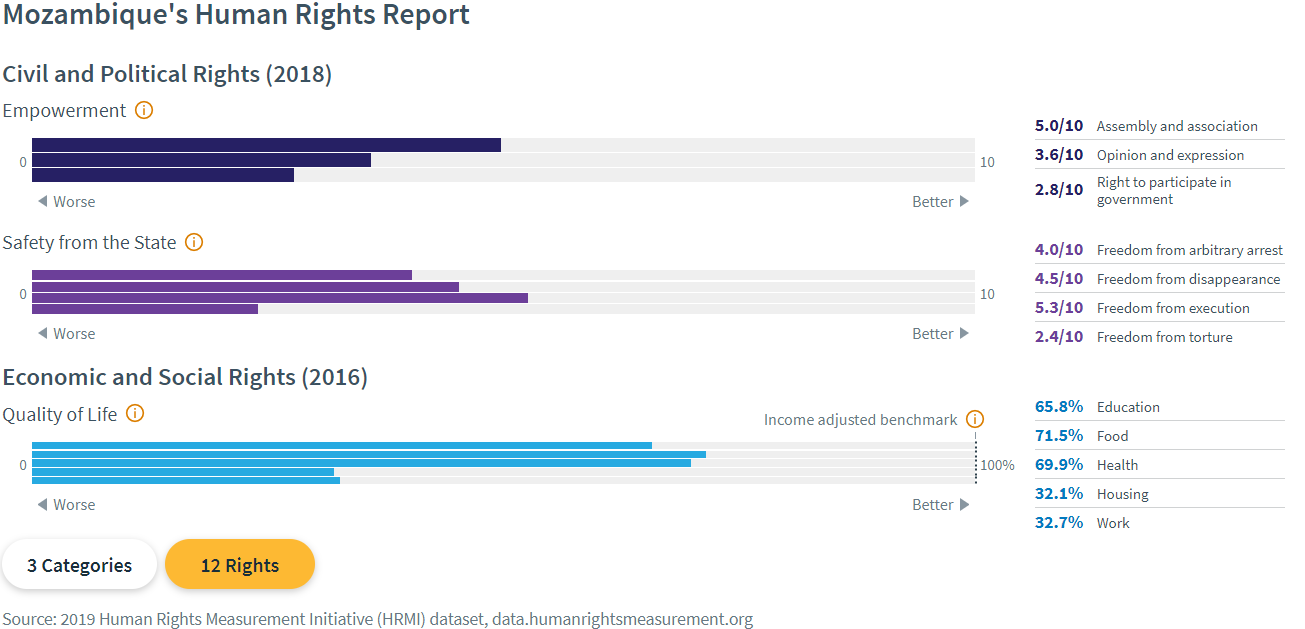
In this chart, each row represents a right. The higher the country’s score is (longer in row length), the better the performance of the country on that human right.
The varying lengths of the rows tells us that Mozambique is performing better on some human rights than on others. If a country were to get perfect scores, the chart would show a fully-shaded rectangle.
Mozambique’s low HRMI score on freedom of opinion and expression supports the impressions of journalists that there are significant threats to freedom of speech.
Mozambique clearly has challenges in several areas, and its low HRMI score on freedom of opinion and expression — 3.6 out of 10 — supports the impressions of journalists that there are significant threats to freedom of speech.
The HRMI data site also displays comparisons of different countries. The graph below shows how the 19 countries in the HRMI survey performed in freedom of speech.
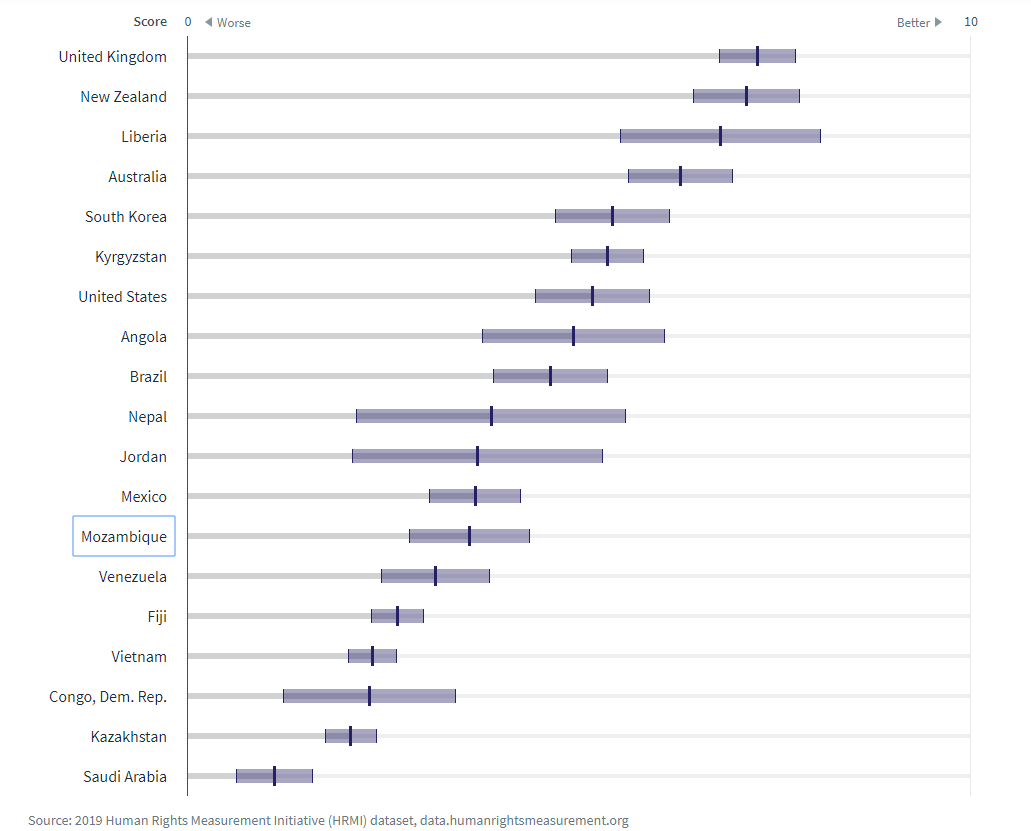
The graph shows that Mozambique’s protection of the right to freedom of expression and opinion is about the same as in Mexico, Jordan, Nepal, Venezuela, Brazil and Angola. Mozambique performs significantly better than Kazakhstan and Saudi Arabia, but worse than Australia, Liberia, New Zealand and Great Britain.
Mozambique performs significantly better than Kazakhstan and Saudi Arabia, but worse than Australia, Liberia, New Zealand and Great Britain.
When we surveyed human rights experts in each country, we also asked them what kinds of groups of people were particularly at risk of having their rights abused or restricted.
Here is the word cloud showing which groups Mozambique experts identified as being at risk, when it comes to freedom of speech. The larger the word, the more respondents identified that group as being at risk. Again, HRMI findings support the concerns of journalists in Mozambique that they are a group highly at risk of having their rights curtailed.
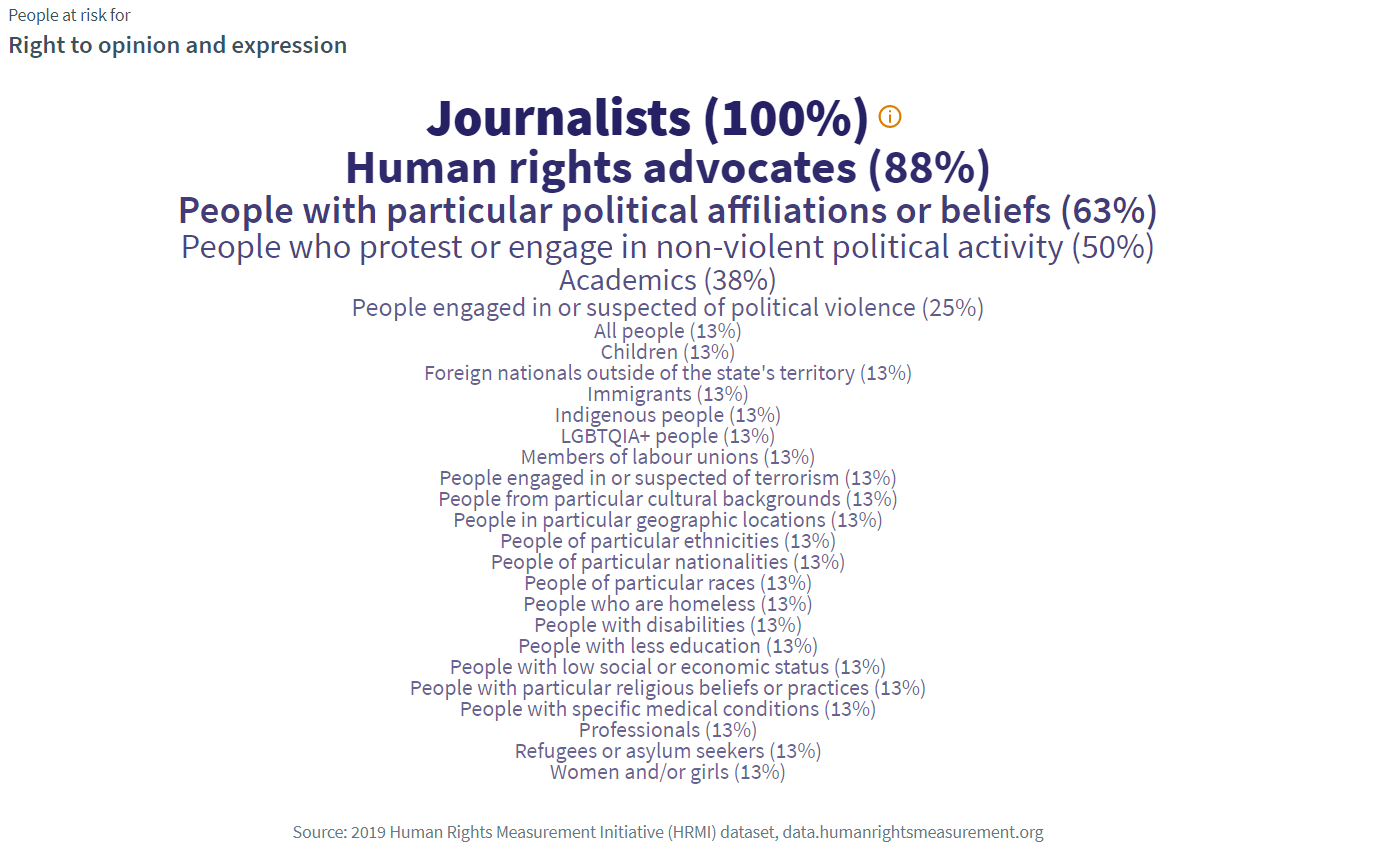

Freedom of speech is closely connected to people’s ability to choose their government democratically. If the press can’t report openly on the performance of the government and the policies of different parties and candidates, people can’t make a meaningful decision at an election.

The Committee to Protect Journalists pointed out that the raising of fees came ‘as the Mozambican government looks to sign natural gas contracts with multinational corporations, and hold municipal elections in October 2018 and general elections in 2019’. The Mail & Guardian also wrote that these elections are the time ‘when politicians are most afraid of the power of credible, independent journalism, making it more dangerous than ever to produce it.’
Who can use these data?
All of HRMI’s data are freely available to anyone. You can explore our data site here, and even download the dataset.
We have data on seven civil and political rights and five economic and social rights:
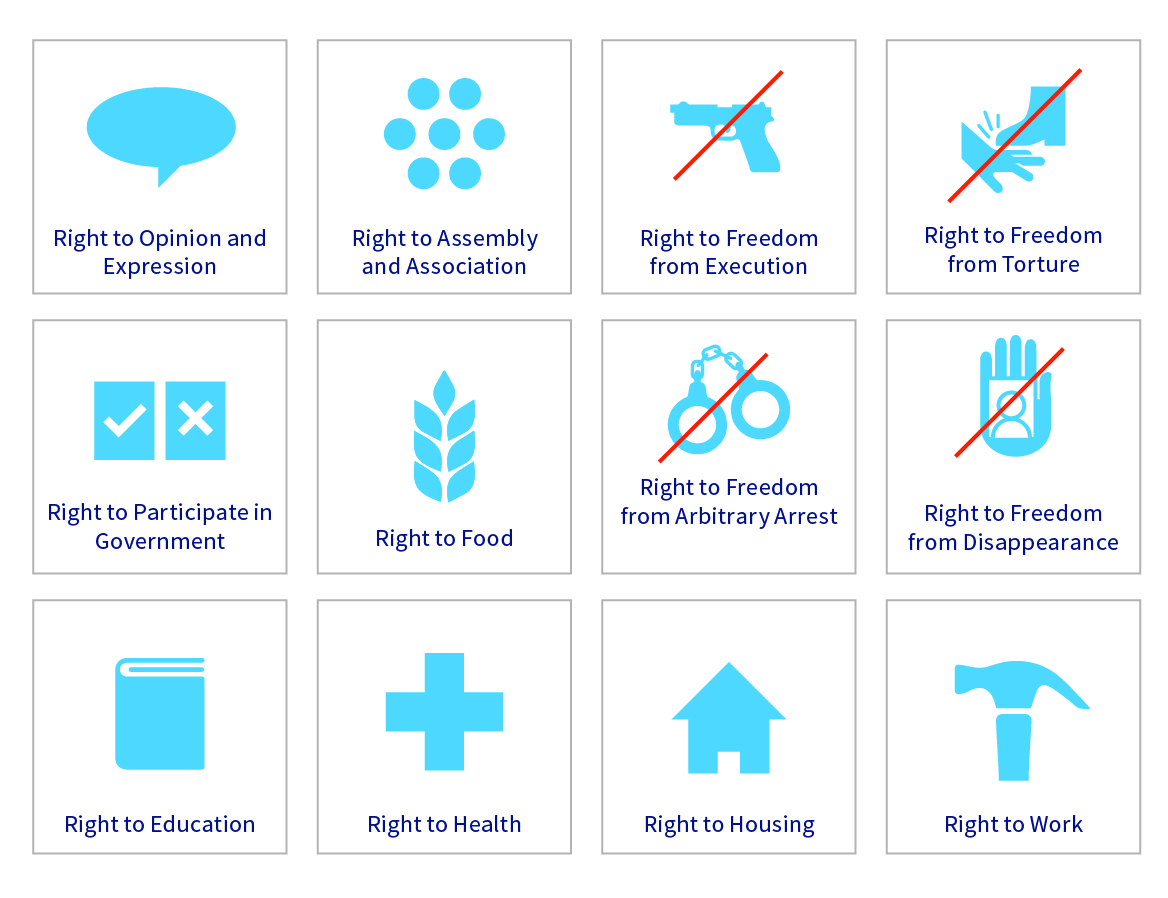
HRMI aims to produce useful data. Some of the people we expect will use our Mozambique data are:
- Journalists, especially those reporting on a Mozambique or Southern Africa, and those focusing on human rights, politics, social issues or international affairs
- Researchers
- Governments
- Human rights advocates
- NGOs
- Human rights monitors within the region, and at the international level
- Private companies, for decision-making, to minimise risk for investors, and direct capital flows ethically.
If you know anyone in those categories, please let them know about HRMI, in case our data can be useful to them.
HRMI’s data have been available for only a few months so far, but as different people use them, we want to share stories and case studies. Whenever you see our data in action, please tell us, and we’ll include a link to it here.


